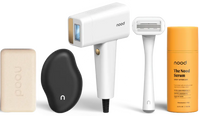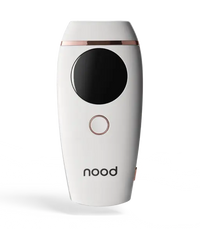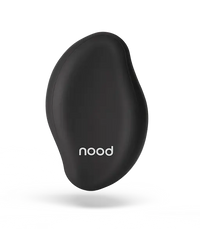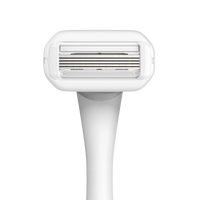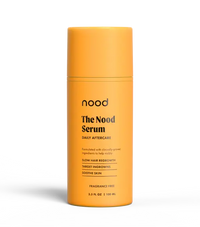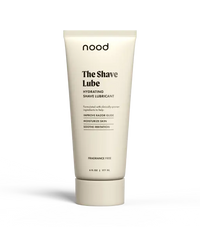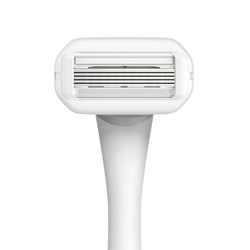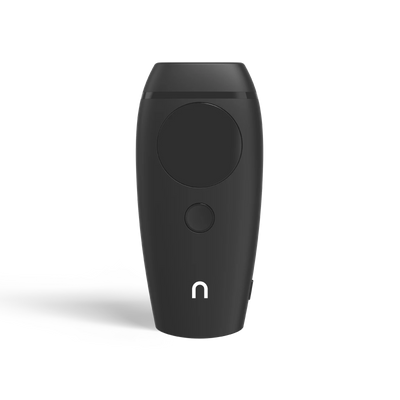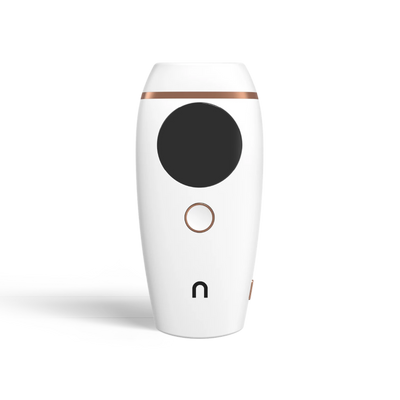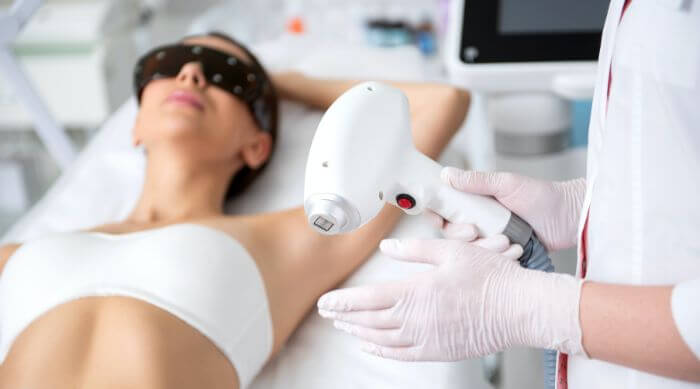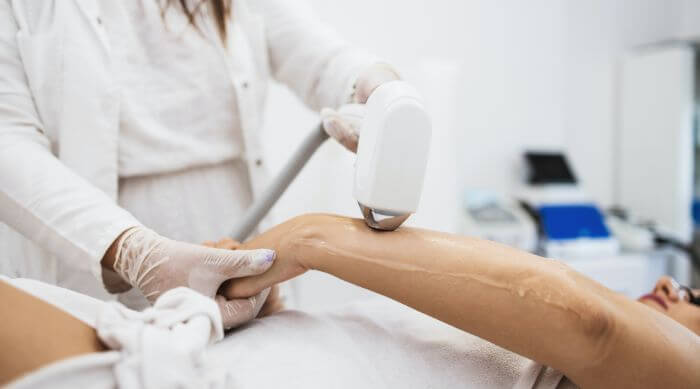
Is Laser Hair Removal Safe During Pregnancy?
There is no hard evidence that laser hair removal is unsafe during pregnancy. There also aren’t definitive studies showing that it is safe.
So can you get laser hair removal while pregnant? Most clinics and estheticians will say to opt for another hair removal method during pregnancy.
When we’re talking babies, it's always best to play it safe and wait to get laser hair removal treatments until you’re no longer pregnant. Honestly, it’s best to check with your doctor about any cosmetic treatments if you’re pregnant or trying to conceive.
Table of Contents
LHR might not be as effective during pregnancy anyway.
So, what are my options for unwanted hair growth?
When can I resume laser hair treatment?
Safety First!
We know laser hair removal and at-home IPL treatments don’t cause infertility. These devices work by targeting the melanin at the hair follicle with heated light energy. The lasers (or Intense Pulsed Light if we’re talking IPL treatments) damage the hair follicle to inhibit hair growth.
None of these devices penetrate far enough to reach your reproductive organs and cause problems with fertility. For the men out there, limited studies show laser light exposure may have a positive short-term effect on your swimmers.
When it comes to pregnancy, though, research is limited.
The research limitations makes sense. We can’t go out and test pregnant people. The research that does exist is based on case studies of women who happened to get laser therapy while pregnant.
Can laser hair removal cause a miscarriage? There is no evidence that laser hair removal can cause a miscarriage.
What if I had laser hair removal before I knew I was pregnant? If you had laser hair removal before you knew you were pregnant, talk to your healthcare provider. The available research shows you shouldn’t worry, but they can talk you through any concerns.
LHR might not be as effective during pregnancy anyway.
We can really only talk about the effects of laser hair removal during pregnancy in theory. Based on what we do know, it may not be all that effective anyway.
Laser hair removal is most effective during active hair growth cycles, or the anagen phase. Those body hair patterns can change during pregnancy. You’ll likely have more active phases compared to telogen, or resting phases, but they can be hard to nail down.
You may find that you’re more hairy than usual when you’re with child, especially if you’ve been dealing with hormonal conditions like polycystic ovary syndrome (PCOS). This could be thanks to excess androgens, or male sex hormones, in the body.
The good news is, changes in hair growth are temporary for most women. Once your hormones chill out post-pregnancy, your body hair should calm down, too.
Potential Risks
What are the risks of laser hair removal while pregnant? The risks of laser hair removal while pregnant include more pain with treatments and scarring.
Laser hair removal is one of the safest, most effective forms of hair removal out there, but some women do experience minor side effects like skin irritation or redness after a session. More serious side effects like paradoxical hypertrichosis and blistering are super rare.
View this post on Instagram
Lower Pain Threshold Laser hair removal can be painful already, but hormonal changes have the potential to affect how we feel pain. In pregnant women, pain tolerance seems to decrease while estrogen is low. This is why skin treatments like waxing and laser hair removal are more painful during your period.
Estrogen and other pregnancy hormones peak during the third trimester. Before you get to that point, though, your body is going through some obvious changes. It’s best not to mess with skin treatments when you’re just not sure how it’ll feel.
In case of C-section…You should wait until your c-section scar is fully healed before restarting laser hair removal, around the pubic area. You don’t want to risk more scarring or a potential infection by getting too close. This waiting time will give your hormones time to adjust, too.
Higher Chance of Scarring In the low chance that you experience a burn or scarring during laser treatments, it may take your body longer to heal from those side effects when you’re pregnant.
While your body rebounds after pregnancy and may actually heal wounds faster like the superhuman it is, longer healing times during pregnancy could mean longer-lasting scars.
Melasmas Some women experience patches hyperpigmentation during pregnancy. Women with darker skin are more at risk, but it’s an important side effect to consider if you’re used to zero issues with laser hair removal.
Both laser hair removal and IPL target the pigment in hair follicles. That’s why obvious contrasts between your skin and your hair are best for these devices. If you’re getting dark patches on your skin during pregnancy, the laser has a difficult time “seeing” those follicles.
Note: Any side effects are less likely to happen with at-home IPL treatments, but a soothing topical aloe gel like The Reviver is always good to have on hand after sessions.
So, what are my options for unwanted hair growth?
We know you love getting laser hair removal and IPL for permanent hair reduction, but you have other options while pregnant that we know are safe. There are also some hair removal methods you should probably avoid just as much as laser hair removal. Let’s get into it.
Electrolysis
Much like laser hair removal, there just isn’t enough research to say that electrolysis is safe during pregnancy. The method works by sending an electric shock into the hair follicle to prevent future regrowth.
It just sounds like something you shouldn’t do while pregnant, but check with the medical professionals if you have more questions. It’s also considered the most painful method of hair removal out there, something you really don’t need to add to your plate while pregnant.
Waxing
Waxing is safe during pregnancy, but that doesn’t mean it’s the best idea.
Remember what we said about pain? It’s more painful to wax vs. laser on a good day, so if you’re feeling more sensitive than usual, it’s probably best to try another method.
If you’re feeling brave and really need that wax for excess hair growth, reduce your risk of ingrown hairs with an exfoliant like The Revealer. Solid skincare is always safe during pregnancy, and the smooth skin you’ll get as a result may help you feel more like yourself.
View this post on Instagram
Threading
Threading, tweezing, and plucking are all safe during pregnancy. Just like waxing, though, you’re pulling hair at the root. That could be more painful when your skin is feeling sensitive.
Depilatory Creams
Depilatory creams use chemicals that break down proteins in your hair, allowing them to be wiped away when time’s up. While the big brands say these creams are safe during pregnancy if used as directed, you may want to err on the side of caution and skip any kind of topical treatment.
Your skin may react differently to these creams while you’re pregnant than it did in the before-times. Most of these creams are also pretty smelly. If you’re sensitive to certain scents thanks to pregnancy hormones, it could be a recipe for nausea.
Shaving
As long as you can reach spots you want to shave without falling over, shaving is the safest method of hair removal while pregnant. It’s cheap and convenient, which is pretty great when you realize you may need to shave more often to get rid of rapidly growing hormonal hair.
If you get to the point where it’s really uncomfortable to shave yourself, there’s no shame in making it a partner activity.
When can I resume laser hair treatment?
You can resume laser hair treatments a few months postpartum. You want to give your body (and your hormones) time to get back to normal. For some women, that can take up to 6 months.
If all of that new hair is making you feel antsy, talk to your doctor about the best time to restart your pre-pregnancy de-fuzzing rituals.
Another option is kicking your laser hair treatments into high gear before you become pregnant. It’s perfectly safe to go about your laser and IPL business before pregnancy. Just keep in mind that it’s not unheard of for body hair to return when hormonal changes are at play.
Is laser hair removal safe if I’m breastfeeding?
There are no studies that show laser hair removal is unsafe if you’re breastfeeding, but it’s also difficult to study the question effectively.
Most experts say to avoid laser hair treatments anywhere near your nipples until you’re done breastfeeding. That area is so sensitive already, and you really don’t want to be dealing with any level of skin irritation when it’s time for your baby to latch.
For other areas, talk to your primary care physician about the best time to return to laser hair removal treatments.
Bottom Line
Here’s the deal: We want you to be as smooth as that new baby’s bottom just as much as you do. We also want you to be safe when you’re tackling unwanted hair, and there’s just not enough research out there to say laser hair removal and IPL are 100% safe during pregnancy.
We always recommend talking to your doctor before starting (or restarting) any hair removal methods while pregnant. They’ll know best about what’s best for you and your unborn baby.
When that time comes, we’ll be here for you. Follow our Instagram in the meantime for hair-free inspo when you’re ready.
Sources
- The effects of low-level laser light exposure on sperm motion characteristics and DNA damage
- A systematic review of elective laser therapy during pregnancy
- Utilization of laser therapy during pregnancy: a systematic review of the maternal and fetal effects reported from 1960 to 2017
- Androgens in pregnancy: roles in parturition
- Hormones and their interaction with the pain experience
- Fetal cells play a role in maternal wound healing after pregnancy
- Extensive hyperpigmentation during pregnancy: a case report

